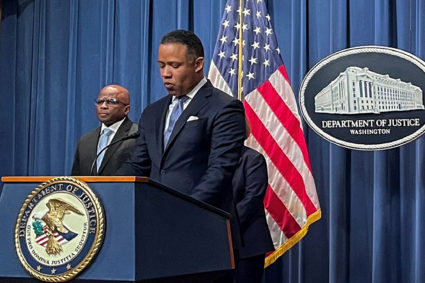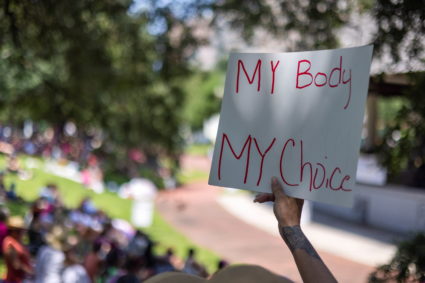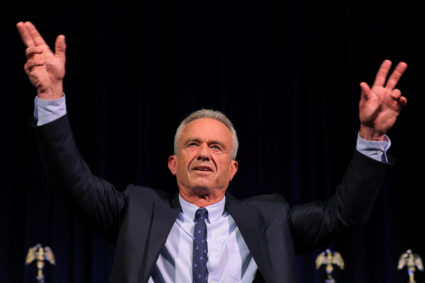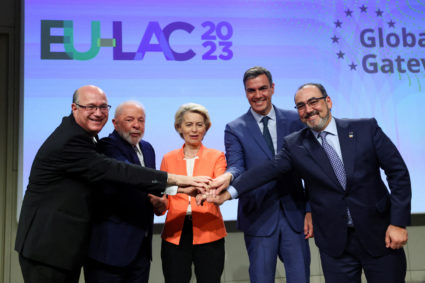The second volume of The Autobiography of Mark Twain has just been published — a scant 113 years after his death. Volume One, published in 2010, was a bestseller. The 700-page book is filled with the author’s pictures and letters and thoughts he dictated to a stenographer. On Sunday’s NewsHour Weekend Hari Sreenivasan talked with Ben Griffin, the book’s associate editor.
Explore Twain’s entry for September 7, 1906, courtesy of the Mark Twain Papers, the Bancroft Library, University of California, Berkeley.
Click the page below to examine Twain’s writing or scroll down for the full text. A higher-resolution version is available here
Full text of the excerpt from Mark Twain’s Autobiography, Vol. II
Friday, September 7, 1906
The statement made at the banquet of the Ends of the Earth Club, “We are of the Anglo-Saxon race,” etc.–Our public and private mottoes and morals–Mr. Clemens’s tribute to British Premier Campbell-Bannerman on his seventieth birthday–Meeting Labouchere–Anecdote of the lost deed which was to have been presented to Prince of Wales.
For good or for evil, we continue to educate Europe. We have held the post of instructor for more than a century and a quarter now. We were not elected to it, we merely took it. We are of the Anglo-Saxon race. At the banquet, last winter, of that organization [page 226] which calls itself the Ends of the Earth Club, the chairman, a retired regular army officer of high grade, proclaimed in a loud voice, and with fervency,
“We are of the Anglo-Saxon race, and when the Anglo-Saxon wants a thing he just takes it.”
That utterance was applauded to the echo. There were perhaps seventy-five civilians present and twenty-five military and naval men. It took those people nearly two minutes to work off their stormy admiration of that great sentiment; and meanwhile the inspired prophet who had discharged it–from his liver, or his intestines, or his esophagus, or wherever he had bred it–stood there glowing and beaming and smiling, and issuing rays of happiness from every pore–rays that were so intense that they were visible, and made him look like the old-time picture in the almanac of the man who stands discharging signs of the zodiac in every direction, and so absorbed in happiness, so steeped in happiness, that he smiles and smiles, and has plainly forgotten that he is painfully and dangerously ruptured and exposed amidships, and needs sewing up right away.
The soldier man’s great utterance, interpreted by the expression which he put into it, meant, in plain English–
“The English and the Americans are thieves, highwaymen, pirates, and we are proud to be of the combination.”
Out of all the English and Americans present, there was not one with the grace to get up and say he was ashamed of being an Anglo-Saxon, and also ashamed of being a member of the human race, since the race must abide under the presence upon it of the Anglo-Saxon taint. I could not perform this office. I could not afford to lose my temper and make a self-righteous exhibition of myself and my superior morals that I might teach this infant class in decency the rudiments of that cult, for they would not be able to grasp it; they would not be able to understand it.
It was an amazing thing to see–that boyishly frank and honest and delighted outburst of enthusiasm over the soldier prophet’s mephitic remark. It looked suspiciously like a revelation–a secret feeling of the national heart surprised into expression and exposure by untoward accident; for it was a representative assemblage. All the chief mechanisms that constitute the machine which drives and vitalizes the national civilization were present–lawyers, bankers, merchants, manufacturers, journalists, politicians, soldiers, sailors–they were all there. Apparently it was the United States in banquet assembled, and qualified to speak with authority for the nation and reveal its private morals to the public view.
The initial welcome of that strange sentiment was not an unwary betrayal, to be repented of upon reflection; and this was shown by the fact that whenever, during the rest of the evening, a speaker found that he was becoming uninteresting and wearisome, he only needed to inject that great Anglo-Saxon moral into the midst of his platitudes to start up that glad storm again. After all, it was only the human race on exhibition. It has always been a peculiarity of the human race that it keeps two sets of morals in stock–the private and real, and the public and artificial.
Our public motto is “In God We Trust,” and when we see those gracious words on [page 227] the trade-dollar (worth sixty cents) they always seem to tremble and whimper with pious emotion. That is our public motto. It transpires that our private one is “When the Anglo-Saxon wants a thing he just takes it.” Our public morals are touchingly set forth in that stately and yet gentle and kindly motto which indicates that we are a nation of gracious and affectionate multitudinous brothers compacted into one–“e pluribus unum.” Our private morals find the light in the sacred phrase “Come, step lively!”
We imported our imperialism from monarchical Europe; also our curious notions of patriotism–that is, if we have any principle of patriotism which any person can definitely and intelligibly define. It is but fair then, no doubt, that we should instruct Europe, in return for these and the other kinds of instruction which we have received from that source.
Something more than a century ago we gave Europe the first notions of liberty it had ever had, and thereby largely and happily helped to bring on the French Revolution and claim a share in its beneficent results. We have taught Europe many lessons since. But for us, Europe might never have known the interviewer; but for us certain of the European states might never have experienced the blessing of extravagant imposts; but for us the European Food Trust might never have acquired the art of poisoning the world for cash; but for us her Insurance Trusts might never have found out the best way to work the widow and orphan for profit; but for us the long delayed resumption of Yellow Journalism in Europe might have been postponed for generations to come. Steadily, continuously, persistently, we are Americanizing Europe, and all in good time we shall get the job perfected. At last, after long waiting, London journalism has adopted our fashion of gathering sentiments from everywhere whenever anything happens that a sentiment can be coined out of. Yesterday arrived this cablegram:
British Premier Campbell-Bannerman celebrates seventieth birthday to-morrow. London Tribune requests tribute.
I furnished it, to wit:
To His Excellency, the British Premier–
Congratulations, not condolences. Before seventy we are merely respected, at best, and we have to behave all the time, or we lose that asset; but after seventy we are respected, esteemed, admired, revered, and don’t have to behave unless we want to. When I first knew you, honored sir, one of us was hardly even respected.
Mark Twain.
A great and brave statesman, and a charming man. I met him first at Marienbad, in Austria, half a generation ago. In the years that have since elapsed I have met him frequently in London, at private dinners in his own house and elsewhere, and at banquets. In Vienna, in ’98, we lived in the same hotel for a time, and the intercourse was daily and familiar. I hope that this explanation will in a measure justify the form of the tribute which I have just quoted. Now that I come to think of it, I am not quite sure that [page 228] anything could really justify me in addressing the acting king of the British Empire in such an irreverent way, but I didn’t think of that when I was putting the words together. I had before me only the companionable comrade of the earlier days, when he was only an important member of Parliament and I was not respected, because I was a bankrupt.
In Marienbad he introduced me to Labouchere, and for a number of days I helped that picturesque personality walk off his mineral water up and down the promenade. His vocabulary, and his energetic use of it, were an unqualified and constant delight to me. Two or three years later, at Homburg, I came across his wife, in the throng of medicinal-water drinkers, and eagerly asked where I might find her husband. She said he was not there, he was in London. I expressed my honest grief, and said I would rather hear him swear than hear an archbishop pray. She had been a great actress in her time, and she knew how to say with effect the thing she had to say, when her heart was in it. Her face lighted with pleasure at the honest admiration which I had expressed for her husband’s power, and she said:
“Oh you never saw him at his best. Mr. Clemens, you ought to see him at home mornings, during the session, standing before the table ready for breakfast, with his back to the fire and his hands parting his coat-tails for the comfort of the warmth–you should hear him break out and curse the Opposition, name by name, and wind up with his comprehensive and unvarying and eloquent formula, ‘the sons of bitches!’ “
I last met Sir Henry at a small dinner party, six years ago, at the house of the Nestor of Parliament of that day. Among the guests were Sir William Vernon Harcourt, leader of the Opposition. I had not seen him for twenty-seven years, but of course I recognized him. The caricatures would make that sure. I asked him if he remembered me, and he said,
“Certainly, it is only twenty-seven years since I saw you last.”
At that time I was beginning to realize that I was old, and I said I hoped that he was either older than I or that he would at least strain a point and say he was, because it had been so long since I had come across any one whose years exceeded mine that I was getting depressed, and needed comfort. He said,
“Well, examine your English history and decide. When I was nine years old I was crossing London Bridge when I heard the tolling bells announce the death of William IV.”
I said, “I am grateful. You have renewed my youth, and if there is anything you desire, even to the half of my kingdom, name it. I have been the oldest man in the earth for months; I am glad to take second place for a while.”
After dinner one of the men present said he could tell the company a curious thing if they would keep it to themselves, and let it be confidential–at least as far as regarded names and dates. He said he was acting as an official, at a function some years before, where the Prince of Wales–the present King–was to receive in state the deed of a vast property which had been conferred upon the nation by a wealthy citizen. It was the narrator’s duty to formally hand the deed to the Prince in an envelope.
When everything was about ready for the presentation his clerk came to him, pale and [page 229] agitated, and informed him in a whisper that the deed had disappeared! It was not in the safe; they had ransacked the place and could find no trace of it. It was a ghastly situation; something must be done, and done promptly. The narrator whispered to the clerk:
“Rush!–fold up a Daily News, shove it into an official envelope, and fetch it here.”
This was done. The official committee of noblemen and gentlemen, bareheaded, and with the narrator at its head, solemnly approached the Prince where he stood supported by his imposing retinue, and with awe inspiring formalities the Daily News was placed in his hands, whereupon he pronounced, in carefully prepared and impressive words, the nation’s profound gratitude to the wealthy citizen for this precious and memorable gift. It was not even a new paper, it was two days old.
The narrator closed with the statement that even unto that day the lost deed had never been found.
















